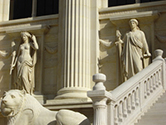|
|
Deontology

The profession lawyer is a very regulated profession, by the law of December 31, 1971, the November 27 1991 decree, organizing the profession of lawyer, the internal rules and regulations established by the Council of the Order and the other laws at the national, community and international level.
Article 3 of 31 December 1971 law, as amended by the Law of 15 June 1982, provides that lawyers shall take the oath in the following terms:
"I swear as a lawyer to exercise my duties with dignity, conscience, independence, probity and humanity."
Le serment engage l'avocat pour toute sa vie professionnelle, à l'acceptation sans réserve de ces principes et règles éthiques, tant dans sa relation avec ses clients, qu’avec ses confrères, dans la conduite du procès ou les maniements de fonds.
The oath commits the lawyer to all his professional life, to fully acceptance without reserve these ethical principles and rules, both in his relationship with his clients and with his colleagues, in the conduct of trial or handling of funds. The principle of loyalty means that, in order to prevent conflicts of interest, our firm may refuse a case, because a lawyer cannot be the counsel, advocate or representative of several parties in the same case if a conflict of their respective interests exist.
Moreover, since the practice of this legal profession is inconceivable without the strictest protection of the most absolute professional secrecy, we guarantee our customers that, there would be confidentiality and trust in our dealings, which cover two mains aspects.
In the first place, the lawyer being the sole confidant of his client, the Cabinet will keep secret of whatsoever has been evoked between walls. Moreover, since professional secrecy is a matter of public policy, no authority could compel him to give evidence or give any indication of what has been said in confidence by a client.
Secondly, communication between lawyers is by nature confidential and no disclosure by the addressee and no correspondence between lawyers can be used in court, which has the advantage, in particular, of facilitating potential discussions and other transactional negotiations in disputes that may arise or already have.
These ethical principles are very capital to Lawyers which, beyond the necessary dedication and commitment for a good defense, constitute the honorable part of the profession and are above all the fundamental guarantors of the independence and the trust relationship between the client and his lawyer.
|



